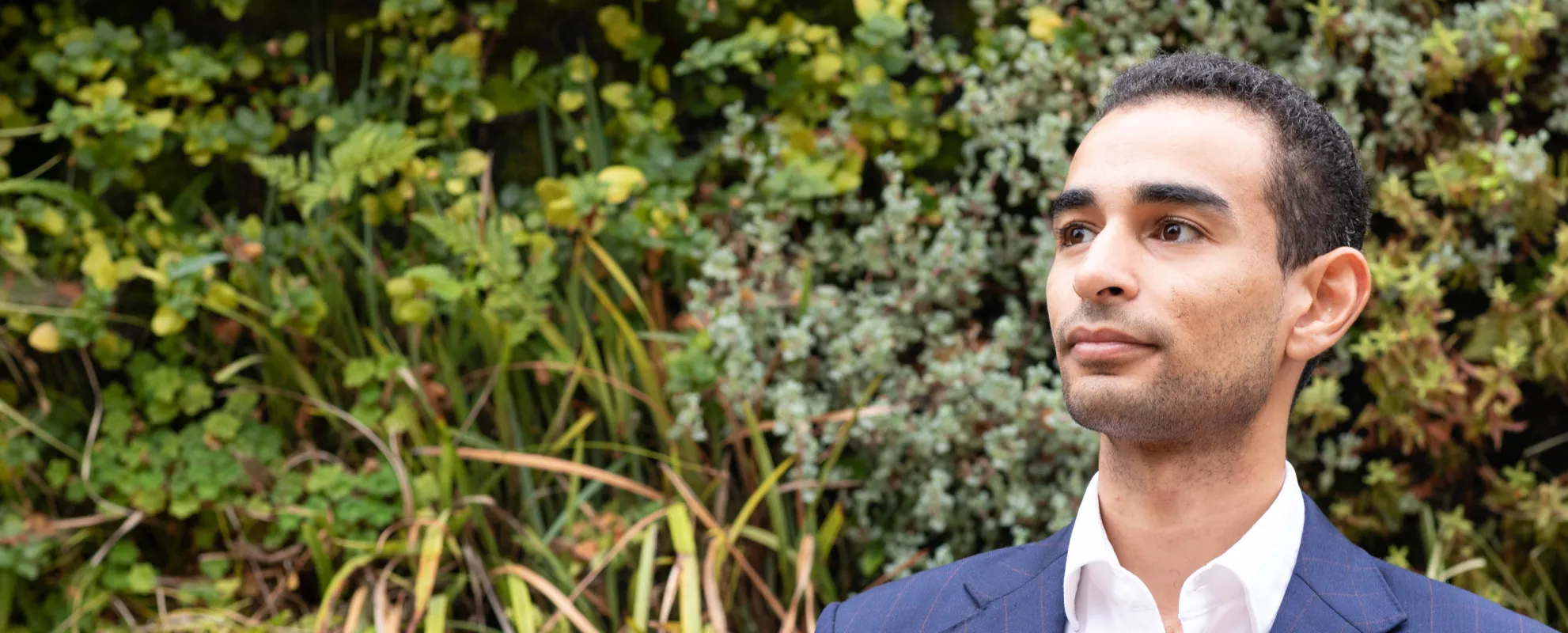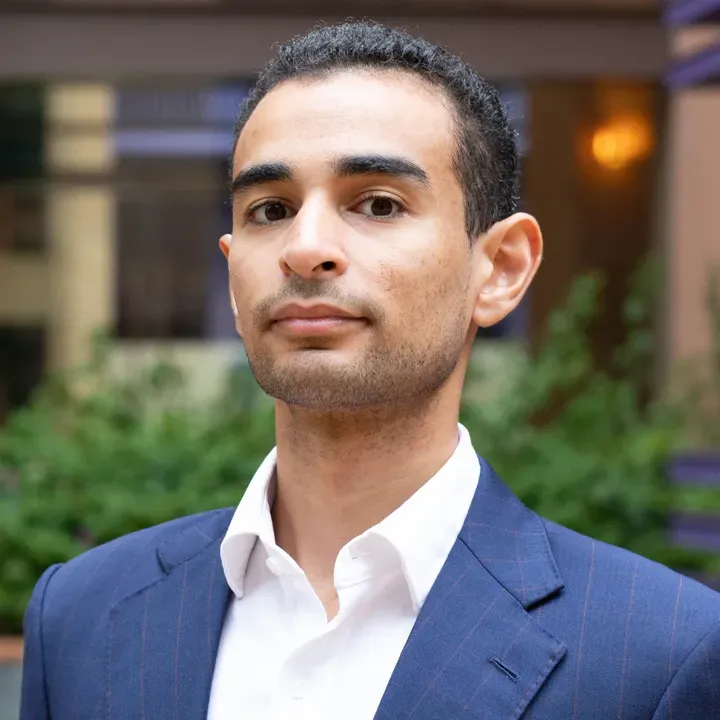Mohamed A. Hussein’s field is marketing, but he’s not just aiming to persuade consumers to buy a certain brand of sneakers or breakfast cereal. Instead, he wants to figure out how to sell democracy — how to get more Americans to engage politically and to listen to one another, rather than repeat stock slogans or wallow in cynicism and apathy.
“I feel it’s a moral obligation,” Hussein says. “We need to protect this democratic system. We need to understand it; we need to make sure that people are engaged and that we can persuade voters to turn out at the polls.”
That passion was first sparked when Hussein was a teenager growing up in Cairo and watching the Arab Spring, a pro-democracy movement that swept across Egypt and other Middle Eastern and North African countries in the early 2010s. While he was too young to participate directly, “it got me interested in how you move people, and how do they go almost overnight from accepting the status quo to suddenly feeling inspired to take action?”
When Hussein came to the U.S. to attend college a few years later, he was shocked to discover that friends and colleagues seemed detached and disinterested in the political process. “Back home, there were people who had lost their lives or been injured just because they wanted the right to vote,” he says. “Here in the U.S., that right is protected, but even so, many can’t be bothered to go and actually vote. That juxtaposition was so stark. But I was, like, hold on a sec. This is really interesting and important.”
As a teenager, your mother, a single parent, lost her job during the financial crisis and could no longer afford to pay for your education. How did that experience shape your thinking and your career path?
In Egypt, there are strong norms and social expectations. It wouldn’t have been acceptable for me to go to work as a waiter or a cashier because then people would have seen that our family was suffering financially. What would look socially acceptable but still generate income?
I had to be creative. I was always really good at Arabic and competed in poetry and grammar competitions. So I thought, who can I teach Arabic to? As it turned out, there were a lot of people from abroad who were interested in learning. But I had another problem — I didn’t speak any English. I had to teach myself. I started listening to BBC radio every day and read every book I could get my hands on and used a dictionary to figure out words. I did that for six months, putting all my energy into it. Once I knew English, I had a way forward. I started connecting with people on language exchange websites. I ended up teaching dozens of students, mostly ones coming from Oxford and Cambridge, to spend a year abroad studying in Egypt. In addition to teaching them the language, I would help them figure out how to negotiate rent, how to go to the doctor, and other parts of daily living.
But I learned from my students, too. I was 14 at the time, and they were juniors in college. They took a tremendous interest in me. One of them changed my life by telling me about United World College, an organization that gives people from all over the world scholarships to finish high school abroad. I ended up applying and getting in. Otherwise, I would have never left Egypt.
You’re interested in finding ways to improve political discourse and get people on opposite sides to listen to one another. What led you to focus on that problem?
When I left Egypt, I attended UWC Pearson, a boarding school in Canada that aimed to bring together young people from different countries and backgrounds. Everyone was on scholarship, and we had more than 70 different nationalities represented. It was life-changing. There was such a strong culture of openness, of trying to hear and learn from one another. There, I noticed that the most persuasive people I’ve come across weren’t the ones who were the loudest or the most boisterous, the ones who steamrolled other people. Instead, they were the people who were willing to take a step back and show that they were open-minded and interested in hearing your perspective.
This got me interested in studying receptiveness — people’s willingness to seek out and engage with ideas and others they disagree with. This construct ended up playing a big role in my PhD dissertation. In my research, I have found that signaling receptiveness to others — by, for example, asking questions, admitting uncertainty, or using more inclusive language — is very impactful. It can make you more persuasive, it can encourage others to share your message and help it spread, and it even decreases the likelihood that your content gets censored online (e.g., on Reddit). It’s a superpower that all of us can tap into. We just have to be humble and communicate that we are open-minded and receptive to other people’s perspectives.
After studying economics at Middlebury College, what led you to go for a PhD in marketing at Stanford?
I wanted to be in a department that was interdisciplinary. At Stanford, we have faculty who are trained as consumer psychologists, social psychologists, and economists. This fits with how I think we should approach consumer behavior research, looking at it from multiple perspectives. In my own research, for example, I run carefully controlled experiments to understand the precise psychology involved, but I also use natural language processing tools to examine how the phenomena I study manifest in the wild.
The other huge thing was the opportunity to be in the pioneer cohort of the Knight-Hennessy Scholars program. It’s a community of people who are really excited about making the world a better place. I have friends who are working on curing blindness or improving female labor participation in India. Constantly interacting with people who are so different from you and are in different fields is an extremely enriching experience academically.
I also was fortunate to get a Diversifying Academia Recruiting Excellence (DARE) Fellowship. It’s a two-year program to prepare Stanford doctoral students for academics. This group, particularly director Anika Green, was how I finally believed that someone with my background has a shot at becoming a professor.
What classes and professors at GSB have been beneficial to you?
Professor of behavioral science and marketing Zak Tormala is my primary advisor, and he’s been a big influence. In my first year, I took a class with him on attitudes and persuasion that really changed my trajectory. Up until that point, I hadn’t really known about attitudes and persuasion or political psychology as subdisciplines, and something just clicked.
Going back to the Arab Spring, I’ve been very passionate and excited about understanding how people form their opinions, how they change them so suddenly, and how you persuade them on social and political issues. Marketing professor Jonathan Levav is so good at distilling ideas down to their very essence. Often, the most impactful research ideas are the ones that are simple and elegant.
And finally, marketing and management professor Christian Wheeler is really good at making sure you understand the boundaries of your ideas. It’s not enough to say that X causes Y. It’s important to ask, why does X cause Y? And under what conditions does X cause Y?
Additionally, I’m a member of sociology professor Robb Willer’s lab. He’s been a great informal mentor to me, and his lab environment has been very enriching intellectually.
What’s the focus of your doctoral thesis?
My dissertation examines the intersection of consumer behavior and politics. For instance, for decades, we consumed political information privately, but now our information consumption habits are pretty public. On Facebook, you can see what kind of events your friends go to, and on Twitter, you can see who people follow and engage with online. Given this visibility, how do we evaluate people who are willing to consume political information from members of the opposing political party? On the one hand, it could be that we admire people who are receptive and want to engage with the other side, and, in fact, a lot of past research supports that notion. On the other hand, because of rising levels of political polarization, we might dislike those who are willing to be receptive to the other side, and that’s what we find. In experiments and in online Reddit data, we find that being receptive to opposing political views carries reputational costs. This matters because in a democracy, you would ideally have voters make up their mind after considering multiple perspectives, but we are finding that peers intervene and punish such open-mindedness, which makes it less likely to happen.
In another part of my dissertation, I look at how consumers react to a novel and increasingly prominent political advertising strategy: what we term “Meddle Ads.” Last year, Democrats tried out a new strategy in which they boosted and helped far-right candidates win Republican primaries because they’re seen as easier to beat. We find that when people learn about the use of this advertising strategy, they dislike candidates who use it, they are less likely to vote for them, and they donate smaller amounts to their re-election campaigns. What’s interesting is that one of the reasons people have this aversive reaction is that they think Meddle Ads can undermine and erode trust in democracy. I think that helps us appreciate how nuanced and complicated political polarization really is and gives us hope that there are still people out there who value and care about protecting democracy.
Photos by Tricia Seibold


